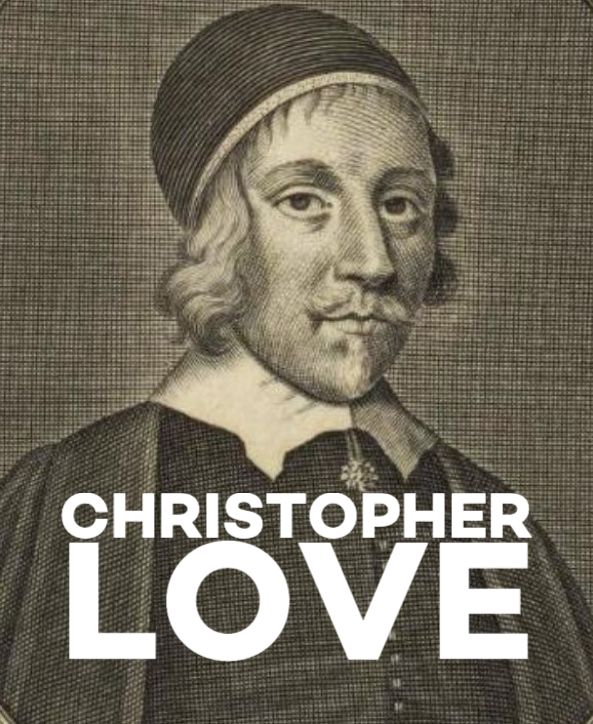“Be not troubled to think what shall become of thee and thine after my death, for be assured that my God, and the God of the widows and the fatherless, will not forsake thee, but will wonderfully provide for those and be comforted in this, that tho’ men take thy husband from thee, they cannot take thy God from thee; and so, do not think that thou hast lost thy husband, but only parted with him for a while, and in the meantime, thy Savour will be a husband unto thee and a father unto thy children.” Excerpt from Christopher Love’s final letter to his wife, Mary.
Those who enjoy reading Richard Sibbes (1577-1635) and Puritan authors whose writings and preaching emphasized the glories of heaven have often neglected Christopher Love (1618-1651).
Christopher Love was born in Cardiff, Wales. He grew up in a middle-class family, received a good education, and loved reading but lived a life of sin. Love did not step into a church until the age of fifteen. Humoring his conscience, he decided to attend a church service with some of his friends. After listening to the preacher, William Erbery, Love became so convicted by sin and hell that he became depressed. The change in his life was so drastic that his father noticed his son changed that day. Love’s father tried to get him to participate in gambling and other sinful activities, but Love refused. As a result, his father locked him in his room to prevent him from going back to church the following Sunday. Love escaped the house using a makeshift rope and left for the church. Love thought “it better to displease his earthly father that to offend his new heavenly Father.”
William Erbery requested permission to have Christopher Love live with him so that he might further instruct him in his education and take proper care of the boy, his father begrudgingly agreed. This proved to be a fruitful decision for Love because he eventually attended Oxford in 1635 and earned his bachelor’s in 1639. However, he did not complete his Master of Arts degree because was expelled from the school for refusing to sign Archbishop Laud’s mandates for pastors in 1640. Love was the first to refuse to sign the mandates which had consequences because two churches in London wanted him to be their pastor, but he was denied because he was not an “ordained minister” due to Laud’s act.
Love moved to London and became chaplain to Sheriff Warner. He met the sheriff’s ward, Mary Stone (1639-1663), he married her, and the Loves had five children: two girls who died early in life, and three boys. One was born thirteen days after Love’s death. In 1641, he was put in prison for his preaching which denounced the errors of The Book of Common Prayer and superstitious ceremonies in the Church of England. Eventually, he was tried in the king’s court and acquitted.
In 1642, he tried for his M.A. but was expelled again because he refused to conform to Laud’s Act. During the Civil War, he became a chaplain and also ministered to many who were ill during the plague. In 1645, he became ordained as a Presbyterian minister and was one of the youngest to be a member of the Westminster Assembly, but he was not as actively involved as other members.
In 1652, Love was arrested for allegedly raising money for attempts at restoring the monarchy under Charles II. Love denied the charge and was convicted of treason for what became known as the “Love Plot.” Love’s wife, father, and many friends (including prominent ministers) in London interceded on his behalf, but to no avail. Love was beheaded on Tower Hill, London, on August 22, 1651, at the age of thirty-three. Presbyterians were divided on the issue. Some regarded Love as a heroic martyr, and others were less sympathetic to Love’s cause. In the end, the Scots and some English, like Love, were badly deceived by Charles II and his promises.
Christopher Love’s life was short and not the most “polished.” Perhaps because his life was cut short at the age of thirty-three and perhaps the reason little is known of him. Despite his short life, he has written much and surpassed many famous Puritans. However, it may be the case that his life was not as significant in history as his death. This is why what is recommended reading would be Love’s letters. Specifically, his correspondence with his wife. One would gather a powerful marriage, one that highlights a husband and wife’s love for one another, and a deep love for the Lord even amid trial.

